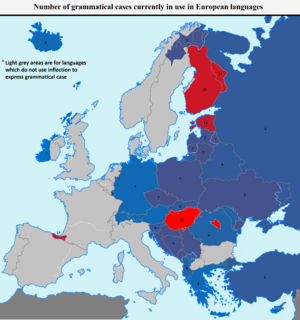Case (grammar) facts for kids
Case is a special way words change their form to show their job in a sentence. Imagine words like nouns, pronouns, or adjectives are actors in a play. Their "case" tells you what role they are playing. Are they the one doing the action, or the one receiving the action?
In many languages, words change their endings to show their case. For example, in Latin or German, a noun might have a different ending if it's the subject (doing the action) compared to if it's the object (having the action done to it). This means word order is less important in those languages.
English has mostly lost this system. We use word order (like Subject-Verb-Object) and small "helping" words instead. However, you can still see cases in our pronouns.
For example, look at "I" and "me":
- I kicked the ball. (I is the subject, doing the kicking)
- John kicked me. (me is the object, receiving the kick)
Other examples include:
- He / Him
- She / Her
- We / Us
- They / Them
- Who / Whom
These different forms show the word's role in the sentence.
What is Grammatical Case?
Grammatical case helps us understand how words relate to each other. It's like a label that tells you the function of a word. This system is very old and was common in many ancient languages.
Think of it this way: if you say "The dog bit the man," you know the dog did the biting. If you say "The man bit the dog," you know the man did the biting. In English, the order of the words tells you this.
In languages with strong case systems, the words themselves would change. So, "dog" might have one ending when it's the biter and a different ending when it's the one being bitten. The word order could even be different, but the endings would still tell you who did what.
Case in Modern English
English has a much simpler case system today. We mostly rely on word order. For nouns, we have two main "cases":
- Common case: This is the regular form of a noun, like girl or girls.
- Genitive case': This shows possession, like girl's (belonging to one girl) or girls (belonging to many girls).
You can't always tell the difference between girls and girl's when you hear them. You need the rest of the sentence to understand the meaning.
For pronouns, English has kept more case forms:
- Subjective case: Used when the pronoun is the subject (doing the action). Examples: I, he, she, we, they.
- Objective case: Used when the pronoun is the object (receiving the action). Examples: me, him, her, us, them.
- Possessive case: Used to show ownership. Examples: my, mine, your, yours, his, hers, its, our, ours, their, theirs.
For example:
- This is your hat. (your comes before the noun)
- This hat is yours. (yours stands alone)
Adjectives in English do not change their form based on case. For example, we always say red hat and red hats, no matter what job "red" is doing in the sentence.
See also
 In Spanish: Caso (gramática) para niños
In Spanish: Caso (gramática) para niños



